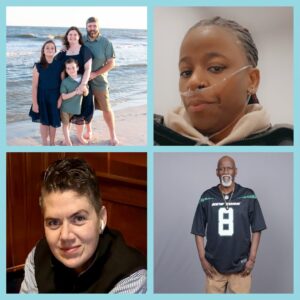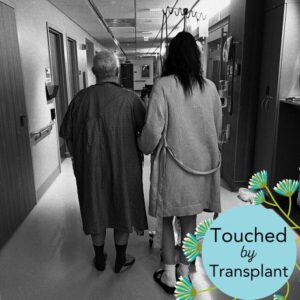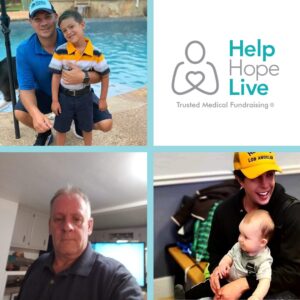At age 13, a spinal cord injury changed Reveca Torres’s life. She began working with HelpHOPELive to fundraise for injury-related expenses in 2008. Now the executive director of the spinal cord injury support community BACKBONES, Reveca devotes her time to helping others discover vital SCI resources and find joy and connection after injury. Here are her insights on connecting with others, fighting stigmas and learning to embrace your new life.
Do spinal cord injuries create both physical and emotional challenges?
Definitely. Physically, your body is entirely different post-injury. You have to re-learn what your body can do. All of your internal systems are affected, from bowels and bladder to body temperature and your sense of touch. Everything is so different. It takes years to be self-aware and understand the new feelings, signals and reactions in your body.
Initially, I thought of my body as broken. Now I know that my body is still alive. It’s still working. I won’t ignore it. You have to learn to stay healthy or you risk being stuck in bed healing from issues and other injuries.
What can you learn through connecting with peers?
I think it’s really important to get to know other people with spinal cord injuries so you can begin to understand how they handle their daily lives. Connection is a great way to learn from others and discover some self-acceptance, too. Getting comfortable with your situation is one of the biggest hurdles when you are first injured. You need to see that others in your situation are making it work.

Connect with others with SCI and learn how they make it work.
Knowing that someone else understands exactly what you’re going through is powerful. It’s wonderful to not have to explain yourself or what you’re feeling. You can talk, ask questions and learn from each other. There’s a lot of relief knowing that someone else knows what it’s like to be you. I hear that when I talk to people on the phone: the conversation starts with a lot of questions, nerves and anticipation. By the end of the call, there’s a sound of relief in the caller’s voice.
What helped you to make a breakthrough after injury?
I didn’t have a lot of friends with injuries after I was injured at 13. I had to learn how to conquer a lot of physical challenges on my own. Acceptance was a big part of that – I was coping with SCI AND being a teen! At college, I met other people with injuries who were playing sports, dating and traveling. That community gave me the confidence to try new things.

Moving away from home helped Reveca find her independence.
I had a lot of support from family and friends and they were behind me all the way after I was injured, but ultimately they couldn’t show me how to build a life for myself. I had to see other people make it happen to get there myself. Moving away from home made a big difference for me. Going away to college was intimidating, but when I got there, other people would approach me and start conversations and we’d become friends. Give yourself those opportunities, whether that means putting yourself out there or moving to an area that gives you access to a stronger SCI community.
Is it tough to make connections if you are nervous or naturally shy?
It is always intimidating at first to connect with others or ask questions. Those physical and emotional challenges after injury can make you feel like you need someone else to advocate for you. Someone close to me gave me a really good piece of advice: become your own advocate. Family members provide as much as they can for someone they love and they want you to get better and get to a good emotional place, but that support can hinder your growth.
Do you have to embrace the “disabled” label to be a part of the SCI community?
Initially, I didn’t want to hang out with other people who used wheelchairs. I didn’t want to identify as “disabled” – I wanted to believe I was still the same person. I was the same person in some ways, but I was also very different after injury, and I had to learn to embrace that. Being part of the disability community doesn’t stop you from participating in the able-bodied world. You can have both!

“There shouldn’t be a line between ‘us’ and ‘them.'”
Being injured is not something any of us asked for or want to be a part of, but the SCI community is a great group of people. We have all gone through something life-changing and we have learned how to adapt. These communities are essential not just for people who are injured but for their friends and family members as well. Our events are open to people with and without disabilities. There shouldn’t be a line between “us” and “them.” We are all human, and we can all relate to one another on different levels.

To connect with other people with spinal cord injuries, visit BACKBONES online. If you need help covering uninsured injury-related expenses, reach out to us.
At age 13, a spinal cord injury changed Reveca Torres’s life. She began working with HelpHOPELive to fundraise for injury-related expenses in 2008. Now the executive director of the spinal cord injury support community BACKBONES, Reveca devotes her time to helping others discover vital SCI resources and find joy and connection after injury. Here are her insights on connecting with others, fighting stigmas and learning to embrace your new life.
Do spinal cord injuries create both physical and emotional challenges?
Definitely. Physically, your body is entirely different post-injury. You have to re-learn what your body can do. All of your internal systems are affected, from bowels and bladder to body temperature and your sense of touch. Everything is so different. It takes years to be self-aware and understand the new feelings, signals and reactions in your body.
Initially, I thought of my body as broken. Now I know that my body is still alive. It’s still working. I won’t ignore it. You have to learn to stay healthy or you risk being stuck in bed healing from issues and other injuries.
What can you learn through connecting with peers?
I think it’s really important to get to know other people with spinal cord injuries so you can begin to understand how they handle their daily lives. Connection is a great way to learn from others and discover some self-acceptance, too. Getting comfortable with your situation is one of the biggest hurdles when you are first injured. You need to see that others in your situation are making it work.

Knowing that someone else understands exactly what you’re going through is powerful. It’s wonderful to not have to explain yourself or what you’re feeling. You can talk, ask questions and learn from each other. There’s a lot of relief knowing that someone else knows what it’s like to be you. I hear that when I talk to people on the phone: the conversation starts with a lot of questions, nerves and anticipation. By the end of the call, there’s a sound of relief in the caller’s voice.
What helped you to make a breakthrough after injury?
I didn’t have a lot of friends with injuries after I was injured at 13. I had to learn how to conquer a lot of physical challenges on my own. Acceptance was a big part of that – I was coping with SCI AND being a teen! At college, I met other people with injuries who were playing sports, dating and traveling. That community gave me the confidence to try new things.

I had a lot of support from family and friends and they were behind me all the way after I was injured, but ultimately they couldn’t show me how to build a life for myself. I had to see other people make it happen to get there myself. Moving away from home made a big difference for me. Going away to college was intimidating, but when I got there, other people would approach me and start conversations and we’d become friends. Give yourself those opportunities, whether that means putting yourself out there or moving to an area that gives you access to a stronger SCI community.
Is it tough to make connections if you are nervous or naturally shy?
It is always intimidating at first to connect with others or ask questions. Those physical and emotional challenges after injury can make you feel like you need someone else to advocate for you. Someone close to me gave me a really good piece of advice: become your own advocate. Family members provide as much as they can for someone they love and they want you to get better and get to a good emotional place, but that support can hinder your growth.
Do you have to embrace the “disabled” label to be a part of the SCI community?
Initially, I didn’t want to hang out with other people who used wheelchairs. I didn’t want to identify as “disabled” – I wanted to believe I was still the same person. I was the same person in some ways, but I was also very different after injury, and I had to learn to embrace that. Being part of the disability community doesn’t stop you from participating in the able-bodied world. You can have both!

Being injured is not something any of us asked for or want to be a part of, but the SCI community is a great group of people. We have all gone through something life-changing and we have learned how to adapt. These communities are essential not just for people who are injured but for their friends and family members as well. Our events are open to people with and without disabilities. There shouldn’t be a line between “us” and “them.” We are all human, and we can all relate to one another on different levels.

To connect with other people with spinal cord injuries, visit BACKBONES online. If you need help covering uninsured injury-related expenses, reach out to us.











